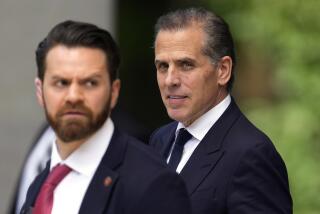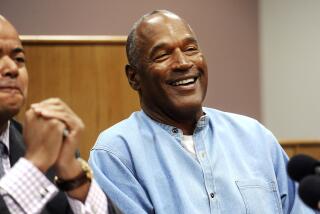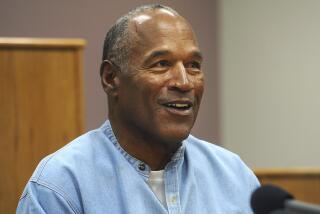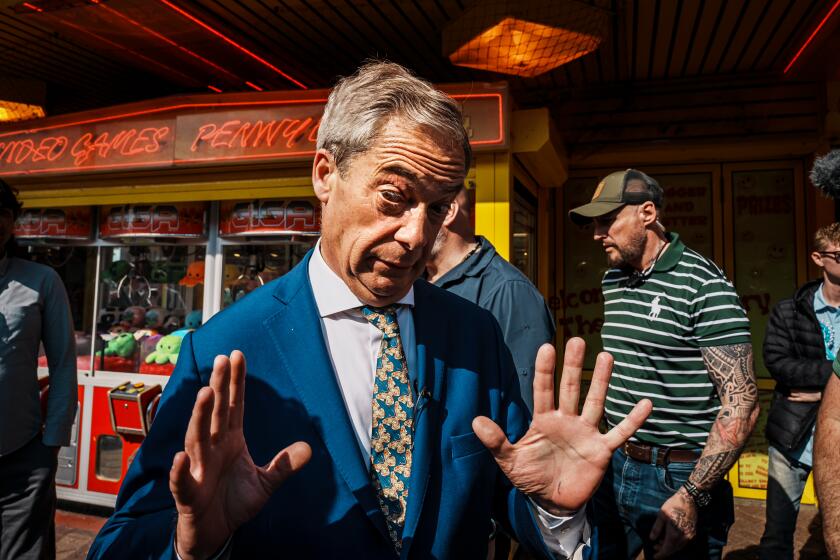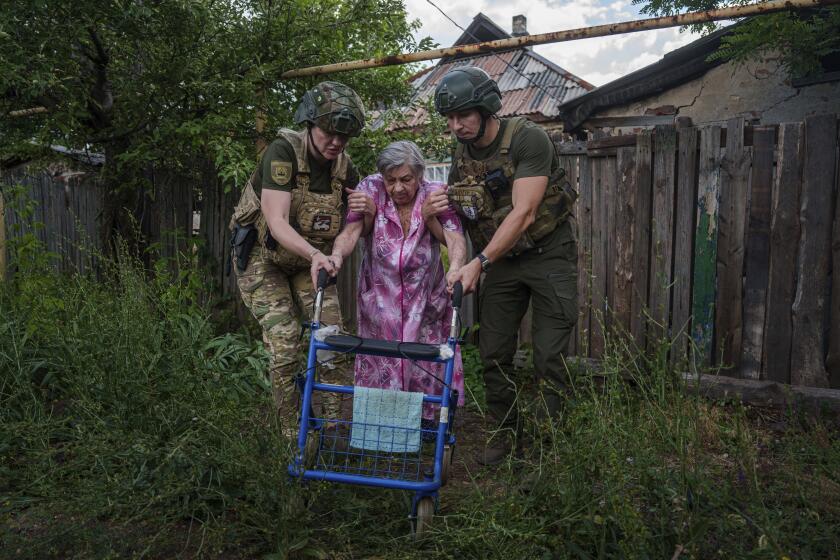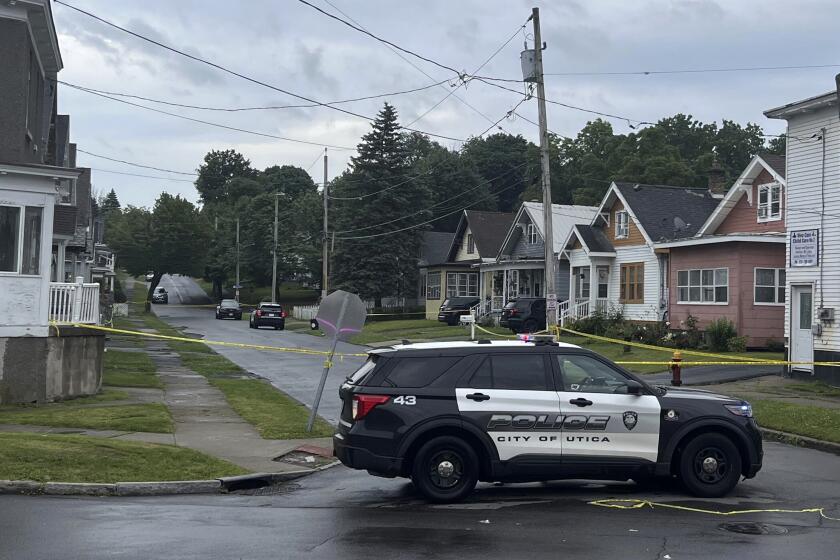After Final Legal Clash, Simpson Case Goes to Jury : Trial: Judge Ito gives instructions to the panel, which will begin deliberations Monday. Defense fiercely objects to prosecution’s rebuttal and montage of victims.
After a last prosecution pitch and a final, heated battle between the two sides, lawyers in the murder trial of O.J. Simpson reluctantly relinquished their hard-fought case to the jury Friday and then settled in for the deliberations that will determine whether Simpson walks free or goes to prison.
Superior Court Judge Lance A. Ito delivered a final batch of instructions to the jury, which has been sequestered since Jan. 11, and asked them to buzz his courtroom three times when the group had selected a foreman or forewoman. The panelists left their seats and retired to the deliberation room. Four minutes later, the loud buzzer in Ito’s courtroom went off twice.
“Maybe we have a verdict, and we can go home,” Simpson lawyer Johnnie L. Cochran Jr. quipped. Then the buzzer went off once more, drawing laughter and applause from the audience and bringing a smile to Cochran’s face as well.
“It’s a good sign that they can agree that quickly on a foreperson,” Ito said.
That ended a long session on a light note, but for the most part the day was somber, even gloomy. Shouldering the burden of proving Simpson’s guilt beyond a reasonable doubt, prosecutors got the last word, which they spent all day delivering to a tense, silent courtroom.
Their case concluded at 3:57 p.m. with a stark and dramatic finish: Prosecutors played 911 audiotapes of Nicole Brown Simpson calling for help, first in 1989 and then in 1993; in the latter tape, she pleads for help as her ex-husband screams at her. On a large screen above the witness box, prosecutors flashed slides of the bruised and battered young woman--in the audience, members of her family averted their eyes; two of her sisters put fingers in their ears to avoid hearing the tapes.
Simpson, who has pleaded not guilty to the murder of his ex-wife and Ronald Lyle Goldman, stared away from the jury, gazing blankly at the far wall of Ito’s courtroom.
The demonstration took just a few minutes, but the final two slides drove the point home: They pictured the scene of the June 12, 1994, murders, and they graphically portrayed, one last time, the bodies of Nicole Simpson and Ron Goldman soaked in blood.
After those slides played and the tapes went silent, Deputy Dist. Atty. Marcia Clark paused for a moment, then spoke again in a soft, husky voice.
“I don’t have to say anything else,” she said. “Ladies and gentlemen, on behalf of the people of the state of California, because we have proven beyond a reasonable doubt, far beyond a reasonable doubt, that the defendant committed these murders, we ask you to find the defendant guilty of murder in the first degree of Ronald Goldman and Nicole Brown. Thank you very much.”
Defense attorneys had aggressively fought the playing of that montage, which combined evidence introduced throughout the trial. Ito, who tangled frequently throughout the day with Simpson attorney Barry Scheck, ruled against them, and his decision left some members of the team fuming.
“This is a trial, not a movie,” defense attorney Peter Neufeld said outside court. “Allowing the prosecution to splice together a 1989 audiotape with a 1994 video confuses a courtroom with a movie theater . . . I’ve been practicing 20 years and I’ve never seen anything like this in state or federal court.”
Protesters, Officials Voice Views
The prosecution concluded its presentation in a city increasingly tense about the outcome. Outside the Downtown Criminal Courts Building, the crowd divided into opposing camps behind police barricades. Some spectators chanted “Free O.J.!” while others called for the former football star’s conviction.
One man carried a sign reading “Fry O.J.”
Despite the heavy police presence, arguments erupted. One black man wearing leather gloves and a T-shirt with the logo “Not Guilty” squared off in a shouting match with a white man carrying a picture of Simpson with a bloody knife. Police pulled the two men, both of them local gadflies, away from the crowd and inside the courthouse. They were placed in handcuffs, but even that was not enough to silence them: They continued to shout at one another.
Police Sgt. William Guerrero estimated that nearly 1,000 spectators gathered outside the courthouse about noon, and about 300 people remained at the end of the court day. Some dressed in costumes, some came to gawk, and others to register their views. And the tussling continued, with one demonstrator shoving another and ripping up his sign.
The swelling emotions surrounding the Simpson case as it grinds to a conclusion drew the attention of community leaders and public officials. Brotherhood Crusade President Danny Bakewell and dozens of community leaders called a news conference to protest criticism of Cochran, while Police Chief Willie L. Williams, whose department has undergone a withering attack by the Simpson legal team, on Friday demanded an apology from the defense lawyers.
“We’re going to have to live with the bile spewed out this past few months,” said Williams, who appeared at a news conference after a Police Academy graduation.
The tempers were lower--but not by much--inside Judge Ito’s courtroom, where jurors heard the final words of the case presented to them and where the lawyers waged a farewell debate over the propriety of their closing arguments.
Several of the panel’s 12 jurors came to court Friday wearing at least some swatches of black clothing. That fact would go unnoticed in any other case but caused a brief media flurry since many of the panelists wore black earlier in the trial to show solidarity with Los Angeles County sheriff’s deputies who were ousted after a juror complained about them.
Despite the media attention, trial participants downplayed any significance to the clothing similarities.
Jo-Ellan Dimitrius, a jury consultant who works for the defense, said she would be wary of inferring too much from anything the jurors were wearing. And defense lawyers Carl E. Douglas and Barry Scheck said they had not even noticed.
With recriminations from the trial reverberating even before it ends, prosecutors pressed ahead with their case in court, delivering their final appeal in the same style as their earlier closing argument. Deputy Dist. Atty. Christopher A. Darden called on the jury to ignore the “smoke” of what he termed a duplicitous defense team, and Clark explained why she felt the attacks on the prosecution evidence were unwarranted.
As with their previous argument, the two prosecutors blended reason and passion. This time, however, they added a more personal touch of indignation and anger.
Darden, for instance, noted that he had prosecuted police officers for seven years, and he told the jury that the way to send a message to the LAPD or to former Detective Mark Fuhrman is not by freeing Simpson.
“It is true that Mark Fuhrman is a racist,” Darden said. “It is also true that this man,” he continued, jabbing a thumb over his right shoulder in Simpson’s direction, “killed these two people.”
‘Everybody Knows It’
In two days of stirring closing arguments, Cochran had called upon jurors to “police the police” with verdicts that would reject the tactics and views of Fuhrman. But Darden responded Friday that acquitting Simpson does not send any message to the Los Angeles Police Department.
“You can’t send a message to Fuhrman, you can’t send a message to the LAPD, you can’t eradicate racism within the LAPD or within the L.A. community or within the nation as a whole by delivering a verdict of not guilty in a case like this where it is clear,” Darden said, staring directly at the jurors, none of whom took notes. “You know it is clear, you feel it, you know it in your heart, you know it as you have sat here day after day listening to this testimony, you know it.”
Then, his voice soft but determined, Darden added: “Everybody knows it. Everybody knows he killed . . . “
That comment prompted a defense objection, one of scores lodged during the course of the prosecution arguments. Ito overruled it, and Darden quietly repeated, “Everybody knows.”
Darden told jurors earlier this week that he did not expect to address them again, but his initial closing statement was widely praised, and he sounded many of the same themes in his final speech, this time adding a more personal touch. He reminded the jurors, for instance, of the tough job that faced them, but he said that he and his colleagues also had performed under difficult circumstances.
“You’ve got a tough job, a very tough job,” Darden said. “I don’t envy you in that regard. But let me tell you something, I have had a tough job, too. The law is a tough thing to enforce in this town. Not everybody, not everybody wants to live up to the law or follow the law. Not everybody thinks that the law applies to them.
“I have been a prosecutor for almost 15 years, and if there is one rule that I have lived by, if there is one rule that means a lot to me, it is this one: No one is above the law; not the police, not the rich, no one.”
That theme--of common people united under one law--echoed through Darden’s comments, which also were rich with racial imagery. He quoted liberally from Martin Luther King Jr. and alluded to Malcolm X, and when he described the testimony of a black Police Department employee, he used it to scorn the defense conspiracy theory.
“That is Willie Ford’s testimony,” Darden said. “You heard that brother testify. Did he look like a co-conspirator to you?”
Not waiting for an answer, he harrumphed: “And they say, ‘Don’t trust the messenger.’ ”
Woven through his comments were discussions of the evidence and the victims. He reminded the jury that the Constitution that Cochran cited in defense of Simpson was written to protect the victims, too. He cited a mistake by Scheck in his closing argument--Scheck said a hair from one of the bloody gloves never had been compared to Fuhrman’s hair, then quickly admitted he was wrong after his error was pointed out to him--as a reminder that jurors should not accept the comments of lawyers at face value.
And he poignantly defied anyone to view Simpson--a former football star whose gridiron performance won him legions of admirers, including Darden--as a hero.
“We talk about heroes,” said Darden. “A hero is a man that would rush into a life-threatening situation to save a woman without ever thinking about himself first.”
At that comment, Detective Philip L. Vannatter, one of the case’s lead investigators and one of the objects of Cochran’s stinging closing argument, leaned across the courtroom rail and put one hand on the knee of Fred Goldman, the murder victim’s father.
“There are no heroes in this courtroom today,” Darden added.
One Last Legal Tempest
Darden’s final comments were frequently interrupted by objections from the defense, and the pace picked up even more when Clark rose to begin her presentation.
She had barely begun before Scheck and Cochran were each firing objections, a violation of the court rule requiring that a single lawyer for each side be responsible for lodging objections.
Ito became increasingly irritated, warning the lawyers that both were not allowed to make objections and overruling each of the defense protests brusquely.
His patience already thin, Ito finally lost his temper when Scheck repeatedly interrupted Clark during a portion of her argument in which she told jurors that she had once been a defense attorney, had taken a pay cut to get her current job, and that she now enjoys the luxury of being able to dismiss a case if she does not believe the evidence would justify a conviction.
“I can never do otherwise,” she said. “That is my obligation.”
With Scheck sputtering with anger, Ito finally sent the jury out of the room.
Once the panel was gone, Clark began to defend herself, only to have Scheck interrupt again.
“Sit down!” Ito barked. Scheck dropped into his seat.
Then Ito turned to Clark, reminding her that court rules do not allow lawyers to vouch for their cases, only to draw inferences from the evidence that the jury has been allowed to consider.
“What you can argue is what the evidence shows,” Ito told her. “You can argue ethical obligations that prosecutors have. I’m just cautioning you that you are close here.”
Scheck protested that Clark already had crossed the line, but she responded that defense lawyers effectively had accused the prosecution of participating in a conspiracy to frame Simpson. As such, she argued that prosecutors had a right and obligation to set the record straight.
Ito agreed, citing Cochran’s oft-repeated refrain that “you can’t trust the messenger, and you can’t trust the message.”
“Mr. Darden clearly cast himself as a messenger in his argument,” Ito said to Scheck. “That was a clear, clear shot at the integrity of counsel on this side, and they are entitled to respond.”
Ever dogged, Scheck continued to protest, arguing that Cochran had only meant to castigate police officers and other witnesses, not prosecutors.
Then, Scheck ventured perilously close to accusing Ito of wrongdoing.
“It’s improper vouching, Your Honor,” the lawyer said of the prosecution argument. “And I think you know it.”
Ito, who has never seemed enamored of Scheck’s brusque approach, glowered down from the bench at him.
“You are close here, Mr. Scheck,” he said.
“I have made my point, Your Honor,” he responded.
With that, Ito invited the jury back in for the balance of Clark’s final remarks. Warned about not personalizing her case any further, the prosecutor for the most part steered clear of inserting herself into her remaining argument.
Recapping the Case
What followed was a long, carefully scripted recitation of the prosecution case, interrupted by 60 objections from the defense--almost without exception overruled by Ito. Clark grew so used to the interjections that she began speaking over them, anticipating Ito’s ruling and refusing to be thrown off stride.
Clark took the panel back through the questions about Simpson’s whereabouts on the night of the murders. She reminded them of the blood, hair and fiber evidence linking him to the crimes. She told the jury that a limousine driver had seen a figure resembling Simpson head inside his house just before 11 p.m.; when Simpson emerged a few minutes later, he told the driver that he had overslept--a statement that Clark said was a lie intended to cover up the fact that he had just returned from committing a murder.
That lie, Clark argued, proved that Simpson was hiding something, hiding the fact that he had just killed two people.
“That,” she added, peering directly at the jurors, “was the defining moment of this trial.”
Turning to the defense’s claims of evidence-planting and contamination, Clark checked off each accusation one at a time. All the drops at the crime scene were consistent with each other, and the results were confirmed by conventional blood analysis, Clark said: “They all come back to the defendant.”
The blood in Simpson’s Bronco, she said, was in places consistent with a person having driven the car--just above the grip of the interior door handle, for instance. That suggested that Simpson left those drops while driving, not while entering it to retrieve what she derisively referred to as his “razor-sharp cell phone,” a reference to the defense team contention that Simpson cut himself in the car while getting the phone.
“It’s ludicrous,” she said of that argument, sighing heavily. “It’s just unbelievable.”
She similarly attempted to dispatch other areas of contested evidence. Then, just before the end of the day, she unveiled a board that displayed areas of evidence that were uncontested. Even the uncontested evidence--such things as the conventional blood tests of the drops at the scene of the crimes, Simpson’s unexplained whereabouts on the night of the murders, and his history of spousal abuse--adds up to enough to justify a conviction, she said.
“It’s very clear, and it’s very obvious,” she said. “Mr. Simpson committed these murders.”
Just before closing with the audiotapes and photographs, Clark again reflected on the case that jurors were about to receive. She professed to join them in having initially wanted to believe that Simpson could not commit such a heinous crime, of having felt that she knew the man made famous on the football field and later in the movies.
“He had strengths, and he had weaknesses,” Clark said of Simpson as he looked toward the jury. “And it’s his weakness that brought us here today. And it’s his weakness that’s why we’re here, and Ron and Nicole are not.”
Relief, Farewells
Once the tapes were played, the slides shown, the arguments ended, the jury charged and the long, gripping drama at last pushed from the courtroom to the jury room--where deliberations will begin Monday--a sense of relief and sadness took hold. A few of the lawyers said their farewells: Neufeld, for instance, approached Eunice Simpson, the defendant’s mother, who has attended many of the proceedings even through her arthritis requires her to use a wheelchair.
“Ma’am,” said Neufeld, who intends to return to New York this weekend, “best of luck.”
Simpson’s sisters bade farewell to reporters, with whom they have been cordial throughout the often tense proceedings. Members of the Brown and Simpson families exchanged hugs and promises to reunite once the trial is over.
Cochran left court in a van with tinted windows and protected by guards from the Nation of Islam.
Later, he praised prosecutors for their efforts but said the defense was hopeful about the outcome.
“We feel really optimistic,” he said. “I thought the [prosecution] ending was effective. Marcia tied it together well. Everyone is tired. We’re optimistic.”
Meanwhile, the exhausted government team shook hands and wryly recalled snippets from the most closely watched criminal trial of modern times.
“Hell of a trial,” Darden said as he shook the hand of Deputy Dist. Atty. William Hodgman, who played a lead role early in the case but had to relegate himself to the sidelines because of a a stress-related problem. “Hell of a trial.”
Then Darden left the courtroom. And as he left, the talented but brooding lawyer--who has won praise from legal analysts but has complained that the Simpson case disillusioned him and soured him on the law--was asked what he would do next.
“This,” he said, “is my last case.”
Times staff writers Lorenza Munoz and Emi Endo contributed to this story.
(BEGIN TEXT OF INFOBOX / INFOGRAPHIC)
The Jury’s Options
Jurors have several options as they deliberate the murder case against O.J. Simpson.
ACQUITTAL
Jurors unanimously decide Simpson is innocent of both murder charges. Simpson would be cleared of the charges and could not be retried.
CONVICTION
A. Simpson is convicted of first-degree murder on both charges.
The mandatory sentence is life in prison without possibility of parole.
B. Simpson is convicted of one count of first-degree murder and one count of second-degree murder.
The mandatory sentence is life in prison without possibility of parole.
C. Simpson is convicted of two counts of second-degree murder. The mandatory sentence is 15 years to life. Parole is possible.
If Simpson is convicted, Judge Lance A. Ito will set a sentencing hearing, probably within 30 days. All murder convictions in California are automatically appealed.
DEADLOCK
Jurors cannot come to a decision. The district attorney could retry Simpson on any undecided charges. Simpson would remain jailed pending retrial.
More to Read
Start your day right
Sign up for Essential California for news, features and recommendations from the L.A. Times and beyond in your inbox six days a week.
You may occasionally receive promotional content from the Los Angeles Times.
